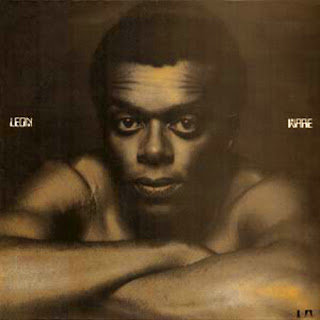 Songwriter, singer, and producer Leon Ware is one of the less-recognized products of the Motown Records music factory of the 1960s and '70s, primarily because he has tended to work behind the scenes despite recording a series of albums under his own name. His signature style is a highly romantic approach to soul music that has resulted in many hit records, notably "I Wanna Be Where You Are," recorded by Michael Jackson, and "I Want You," recorded by Marvin Gaye, both of which he co-wrote.
Songwriter, singer, and producer Leon Ware is one of the less-recognized products of the Motown Records music factory of the 1960s and '70s, primarily because he has tended to work behind the scenes despite recording a series of albums under his own name. His signature style is a highly romantic approach to soul music that has resulted in many hit records, notably "I Wanna Be Where You Are," recorded by Michael Jackson, and "I Want You," recorded by Marvin Gaye, both of which he co-wrote.Growing up as an aspiring musical artist in Detroit, Ware naturally became part of Motown Records, which was founded in the city as he approached manhood. In the spring of 1967, the Isley Brothers' recording of "Got to Have You Back," which he wrote with Ivy Hunter and Steve Bowden, placed in both the R&B and pop singles charts after its release on the Motown imprint Tamla Records. But his first major hit as a writer came with the Four Tops' "Just Seven Numbers (Can Straighten Out My Life)," co-written with Pam Sawyer and released as a single on Motown, which reached the Top Ten of the R&B charts and the Top 40 of the pop charts in early 1971. He was not working exclusively for Motown, either. During 1971, he collaborated with Ike & Tina Turner, co-writing six songs on their album 'Nuff Said, released that fall on United Artists Records. The album reached the Top 40 of the R&B charts and also appeared in the pop charts. Ware himself was contracted to United Artists, and his self-titled debut album appeared on the label in 1972.
Back at Motown, Ware began collaborating with Arthur "T-Boy" Ross, younger brother of Motown star Diana Ross, and they came up with "I Wanna Be Where You Are," which Michael Jackson recorded for Motown on his early-1972 album Got to Be There. Released as a single in the spring, it peaked at number two on the R&B charts and reached the Top 20 of the pop charts. Over time, it became one of Ware's most-covered songs, earning recordings by José Feliciano, Marvin Gaye, SWV, and others. In 1973, Ware had songwriting credits on albums by the Average White Band, Donny Hathaway, and the Jackson 5. "Give Me Just Another Day," which he wrote for the Miracles, was released as a single on Tamla that fall and reached the R&B charts. His next R&B singles chart entry came with "If You Were My Woman," an answer record to the Gladys Knight & the Pips hit "If You Were My Man," recorded by Latimore on Glades Records, in the spring of 1974. That same season saw the release of a more important project for him, Quincy Jones' LP Body Heat on A&M Records. Ware was both a writer and performer on the disc, which topped the R&B charts and reached the pop Top Ten, going gold. "If I Ever Lose This Heaven," which he wrote with Pam Sawyer and sang on the album with Minnie Riperton and Al Jarreau, was an R&B singles chart entry in September. Nearly a year later, it gained even greater renown when it was covered by the Average White Band on Atlantic for a single that reached the Top 40 of both the pop and R&B charts. It went on to become another major copyright for Ware, covered by such artists as Jonathan Butler, Sergio Mendes, and Nancy Wilson. Meanwhile, the title track from Body Heat, co-written by Ware, also became an R&B singles chart entry in the spring of 1975. "Rolling Down a Mountainside," which he wrote with Jacqueline Hilliard, also became an R&B hit, this one for the Main Ingredient on RCA Victor Records that spring, peaking in the Top Ten and also getting into the pop chart before serving as the title track on the group's next album. Ware collaborated with Minnie Riperton and Richard Rudolph on "Inside My Love," which was featured on her Epic Records album Adventures in Paradise, also released in the spring of 1975. Issued as a single that summer, the song became a Top 40 R&B hit and reached the pop charts.
Ware had two projects in progress at Motown during this period. He was producing songs for T-Boy Ross, and he was recording his own solo album. But when label president Berry Gordy heard one of the proposed Ross tracks, "I Want You," he decided that Marvin Gaye should cut it instead. And when Gaye heard the material Ware had done for his album, it was turned into a Gaye LP instead. Ware produced what now became Gaye's I Want You album, released on Tamla in March 1976, having co-written all the songs on it. The title tune (co-written with Ross) topped the R&B charts and made the Top 20 of the pop charts. It went on to become a standard, covered by Herb Alpert, Gato Barbieri, Madonna, and Michael McDonald among many others. Robert Palmer's medley of it with "Mercy Mercy Me (The Ecology)," another Gaye hit, reached the pop Top 20 in 1991. The I Want You album went to number one on the R&B charts and the Top Ten of the pop charts. It spun off a second single, "After the Dance," co-written by Ware, Ross, and Gaye, that made the R&B Top 20 and was a pop chart entry. AMG.
listen here
FR
 / USA
/ USA / UK
/ UK

Sem comentários:
Enviar um comentário